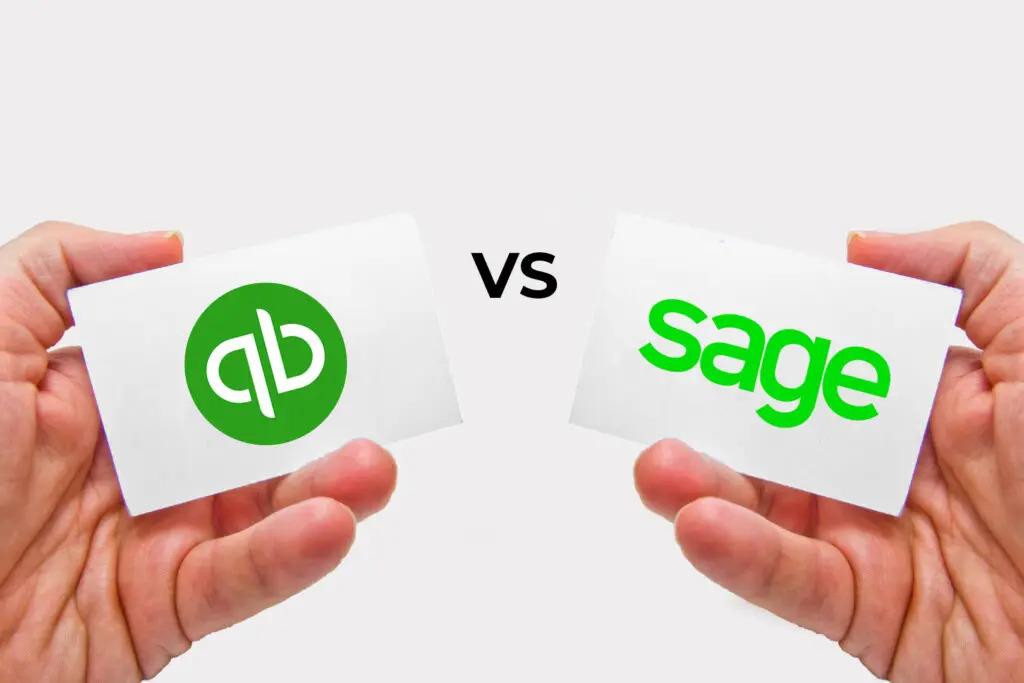When it comes to accounting software, QuickBooks vs Sage are two heavyweights vying for dominance. These powerful tools streamline financial management for businesses of all sizes. However, determining the superior option requires a deep dive into their features and capabilities. This comprehensive guide dissects the pros and cons of each platform, empowering you to make an informed decision.
QuickBooks: The Industry Stalwart
Developed by Intuit, QuickBooks has long been a household name in the accounting realm. Its widespread adoption is a testament to its user-friendly interface and robust feature set. Firstly, QuickBooks excels in simplifying bookkeeping tasks. Its intuitive design allows even non-accountants to navigate seamlessly through invoicing, expense tracking, and financial reporting.
Furthermore, QuickBooks offers industry-specific solutions tailored to sectors like construction, manufacturing, and non-profits. This versatility ensures businesses can manage their unique financial needs effectively. Additionally, QuickBooks seamlessly integrates with over 650 third-party applications, fostering a comprehensive ecosystem for businesses.
Sage: The Powerhouse for Comprehensive Accounting
Sage, on the other hand, is renowned for its comprehensive accounting capabilities. Its suite of products caters to businesses of all sizes, from small startups to large enterprises. Notably, Sage 50cloud and Sage 100 are two standout offerings that provide robust financial management tools.
One of Sage’s key strengths lies in its inventory management capabilities. The software excels in tracking stock levels, managing purchase orders, and streamlining warehouse operations. Moreover, Sage offers industry-specific solutions for sectors like construction, distribution, and manufacturing, ensuring businesses can manage their unique financial needs.
Ease of Use: Simplicity vs. Complexity
When it comes to ease of use, QuickBooks takes the lead with its intuitive, user-friendly interface. The software’s clean layout and straightforward navigation make it accessible even for those with minimal accounting knowledge. In contrast, Sage’s interface can be more complex, requiring a steeper learning curve for new users.
However, this complexity is a double-edged sword. While Sage may be less beginner-friendly, its depth of features and customization options cater to businesses with more advanced accounting needs. Ultimately, the choice between simplicity and complexity depends on the user’s expertise and the complexity of their financial operations.
Reporting and Analytics: Insights at Your Fingertips
Accurate reporting and analytics are crucial for informed decision-making. Both QuickBooks and Sage offer robust reporting capabilities, but their approaches differ. QuickBooks provides a wide range of pre-built reports covering various financial aspects, from profit and loss statements to balance sheets and cash flow analyses.
Sage, on the other hand, offers more customizable reporting options, allowing businesses to tailor reports to their specific needs. Additionally, Sage’s business intelligence tools provide in-depth insights through data visualization and dashboards, enabling advanced data analysis and forecasting.
Integration and Scalability: Future-Proofing Your Business
As businesses grow, their software needs to adapt accordingly. Both QuickBooks and Sage offer varying degrees of integration and scalability to accommodate evolving requirements. QuickBooks seamlessly integrates with a vast array of third-party applications, facilitating data sharing and process automation across various business functions.
Sage, conversely, offers a comprehensive suite of products designed to scale with businesses. From Sage 50cloud for small businesses to Sage X3 for enterprise-level operations, Sage’s solutions can adapt to changing needs, ensuring a smooth transition as businesses expand.
Mobile Accessibility: Accounting on the Go
In today’s fast-paced business landscape, mobile accessibility is paramount. QuickBooks and Sage both offer mobile apps, allowing users to access financial data and perform key tasks on the go. However, their mobile capabilities differ in scope.
QuickBooks’ mobile app provides a streamlined experience, enabling users to capture receipts, create invoices, and track expenses from their smartphones or tablets. Sage’s mobile offerings vary depending on the specific product, with some providing more comprehensive mobile functionality than others.
Industry Specialization: Tailored Solutions
While both QuickBooks and Sage cater to a wide range of industries, each software excels in specific sectors. QuickBooks shines in industries like professional services, retail, and non-profits, offering tailored features and templates to address their unique needs.
Sage, conversely, is particularly strong in industries like construction, manufacturing, and distribution, providing robust inventory management, job costing, and supply chain management capabilities. Businesses operating in these sectors may find Sage’s industry-specific solutions more aligned with their requirements.
Customer Support and Training: Ensuring a Smooth Transition
Implementing new accounting software can be a daunting task, which is why both QuickBooks and Sage place a strong emphasis on customer support and training. QuickBooks offers extensive online resources, including tutorials, webinars, and a vast knowledgebase, to help users get up to speed quickly.
Sage, on the other hand, provides comprehensive training programs, including classroom-based sessions and certified consultants, to ensure businesses can fully leverage the software’s capabilities. Additionally, both companies offer various support channels, such as phone, email, and online forums, to address user queries and concerns.
Pricing and Cost Considerations
Cost is often a deciding factor when selecting accounting software. QuickBooks offers different pricing tiers, ranging from the self-employed plan at $25 per month to the advanced plan at $180 per month. These plans vary in features and user capacity, allowing businesses to choose the option that best fits their budget and needs.
Sage’s pricing structure is more complex, with different products catering to different business sizes and requirements. For instance, Sage 50cloud starts at $52.08 per month, while Sage 100 and Sage X3 are priced based on the number of users and required modules, making them suitable for larger organizations with more complex accounting needs.
Ultimately, the choice between QuickBooks and Sage depends on various factors, including business size, industry, accounting complexity, and budget. By carefully evaluating your specific requirements and weighing the pros and cons of each software, you can make an informed decision that aligns with your organization’s financial management needs.






